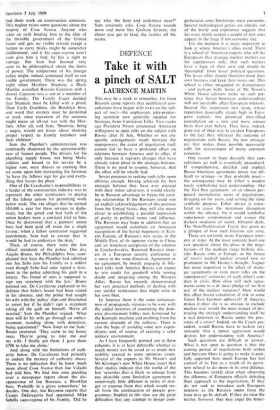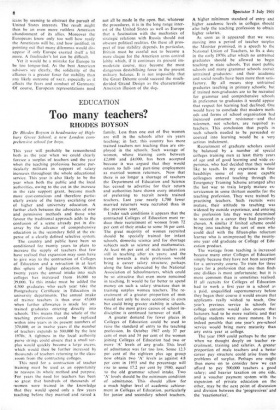DEFENCE
Take it with a pinch of SALT
LAURENCE MARTIN
This may be a week to remember, for from Brussels come reports that multilateral con- sultations have begun with NATO on the sub- ject of SALT—the unpleasant, joke-produc- ing acronym now generally adopted for Strategic Arms Limitation Talks. Two weeks ago President Nixon announced American willingness to open talks on the subject with Russia after 31 July. Whether or not any specific arrangements result between the superpowers, the event of negotiation itself cannot fail to have a profound effect on relations between America and its allies, if only because it registers changes that have already taken place in the strategic balance. There is no need to assume, however, that the effect will be wholly bad.
Soviet purposes in seeking such talks seem obvious enough. Having achieved the best strategic balance they have ever enjoyed with their richer adversary, it would clearly be to Russian advantage to freeze the exist- ing relationship. If the Russians could win an explicit acknowledgement of this position from the United States, they will also move closer to establishing a parallel impression of parity in political status and influence. The Russians may hope in addition that an agreement would constitute an American recognition of the Soviet hegemony in East- ern Europe, of Russian's new status in the Middle East. of its superior virtue to China and an American acceptance of the solution in Czechoslovakia. Renewed Russian inter- est in a European security conference is a move in the same direction. Agreement or no agreement, by merely engaging in bila- teral talks with America Russia can expect to win credit for goodwill while sowing doubt and misgiving among the Western Allies. Russia has recently demonstrated her very practical methods of dealing with any similar restlessness that might arise in her own bloc.
In America there is the same conscious- ness of propaganda victories to be won. with the added incentive of countering the dom- estic disarmament lobby, now harnessed by the Kennedy machine and profiting from the current discredit of the military. There is also the hope of avoiding some new expen- ditures and. of course, of creating a safer military environment.
As I have frequently pointed out in these columns, it is at least debatable whether as much money can be saved or as much new stability created as some optimists assert. Several of the experts -in Mr Nixon's and Mr Kissinger's new White House assert that their studies indicate that the world of the late 'seventies that is likely to emerge from any plausible arms limitation agreement is surprisingly little different in terms of dan- ger or expense from that which would res- ult from the continuation of present pro- grammes. Implicit in this view are the great difficulties that any attempt to design corn-
prehensive arms limitations must encounter. Several technological genies are already out of the bottle and experience suggests that for every bottle corked a couple of new ones appear in the large if not economy size.
For the moment it is more important to look at where America's allies stand. There is a school of American experts who tell the Europeans that strategic nuclear matters are for superpowers only, that such matters have a logic of their own and should be Vecoupled' from lesser political questions. The lesser allies should therefore mind their own business and keep their noses out. This school is either misguided or disingenuous —and perhaps both. Some of Mr Nixon's White House advisers make no such pre- tence that Soviet-American understandings will not inevitably affect European interests. Instead this impressive new team, whose reputation deservedly stands high in Euro- pean capitals, has promised inter-allied consultation on a new and more serious basis than ever before. They have, indeed. gone out of their way to awaken Europeans to the fact that, whatever the outcome of negotiations with Russia, the new strategic era that makes them possible necessarily calls for reassessment of many common concerns.
One reason to hope devoutly that con- sultations go well is essentially procedural. If comprehensive, detailed and explicit Russo-American agreements prove too dif- ficult to arrange—as they probably must— the consequence may be either a modest treaty symbolising tacit understanding—like the Test Ban agreement—or an almost per- petual. inconclusive, series of negotiations, dragging on for years, and serving the same symbolic purpose. Either device is calcu- lated to cause the maximum disruption within the alliance, for it would symbolise superpower condominion and arouse the darkest suspicion of secret, bilateral deals. The Non-Proliferation Treaty has given us a glimpse of how such frictions can arise.
There are certainly many European inter- ests at stake. At the most concrete level one can speculate about the place in the nego- tiations of the medium range ballistic mis- siles Russia aims at Europc, or the future of NATO'S tactical nuclear arsenal now so prominent in Mr Healey's thought. Vaguer but more important is the effect of strate- gic agreements or even mere talks on the superpowers' estimates of each other's con- duct in crisis. How close will such agree- ments come to a de facto pledge of `no first use' of the nuclear weapons? How would this affect Soviet calculation of risk in some future East German upheaval? If America makes it clear she is so anxious to exclude nuclear war, would the mere danger of des- troying the strategic understanding itself be a real deterrent to Russia under the pres- sures of a crisis? Indeed, on the Czech pre- cedent, would Russia have to reckon very seriously that a minor aggression would destroy her understanding with America?
Such questions are difficult to answer. What is not open to question is that the coming period of negotiations both within and between blocs is going to make it pain- fully apparent how much Europe has losf control of its fate as a result of its persis- tent refusal to do more in its own defence. This becomes starkly clear when observing the dilemma of European officials debating their approach to the negotiations. If they do no seek to introduce such European interests as the Russian MRBM force the issue may go by default. If they do raise the matter, however, they may anger the Amer-
icans by seeming to obstruct the pursuit of United States interests. The result might then be an even more ruthless American abandonment of its allies. Moreover the Europeans know only too well how ready the Americans will be, and how justified, in pointing out that many dilemmas would dis- appear if only Europe exerted itself a bit more. A freeloader's lot can be difficult.
Yet it would be a mistake for Europe to be too tongue-tied. As the best American advisors see clearly, the solidarity of the alliance is a greater force for stability than any likely outcome of SALT, especially as it affects the fears and conduct of Germany. Of course, European representations need
not all be made in the open. But, whatever the procedures, it is in the long range inter- est of the United States as well as Europe that a fascination with the mechanics of strategic relations with Russia should not obscure political realities. On these all pros- pect of true stability depends. In particular, Britain must be careful not to become a mere claque for the American arms control lobby which, if it continues its present im- moderate course, may become the most dangerous destabilising force in the present military balance. It is not impossible that the Great Détente could succeed the much- derided Grand Design as the characteristic American illusion of the day.



































 Previous page
Previous page